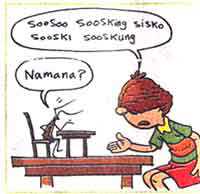Credit: TÜBİTAK
Virtually all books about evolution—along with more than 100 other titles from other fields—have apparently disappeared in recent months from the selection of popular science books for sale by the Scientific and Technological Research Council of Turkey (TÜBİTAK), the country’s main science funding agency. The missing books have prompted the latest skirmish in the long-running conflict between the government and parts of the country’s academic community. But TÜBİTAK has denied censoring the books, saying that they are unavailable because of copyright issues.
Through its popular science book program, TÜBİTAK translates a range of science books into Turkish and sells them to the public, both directly and through bookstores. It used to offer more than 450 titles, including more than a dozen books about evolution such as Darwin and the Beagle by Alan Moorehead, The Blind Watchmaker and The Selfish Gene by Richard Dawkins, and James Watson’s The Double Helix. A list of books offered until recently (in Turkish) is available on an outdated but still accessible version of TÜBİTAK’s Web site. On the current Web site, the books are no longer listed.
Relations between the government of Prime Minister Recep Tayyip Erdoğan and Turkey’s academic establishment have been rocky since Erdoğan’s party won a large majority in parliament a decade ago. Academics have decried what they say is government meddling in the organization and oversight of both TÜBİTAK and the Turkish Academy of Sciences, which led to one-third of the academy members resigning and forming a new independent Science Academy. Some prominent academics have also been arrested. Evolution has been a flash point before, when TÜBİTAK delayed an article about Darwin in one of its publications. (The article was published after public outcry.) There have also been some apparent attempts to censor evolution-related Web sites.
A Weekly Chat on the Hottest Topics in Science Thursdays 3 p.m. EDT
Earlier this month, several Turkish newspapers reported that the evolution-related books were unavailable, and suggested that TÜBİTAK had censored them. A few days later, TÜBİTAK denied censoring the books, saying that the newspaper stories were part of a smear campaign. But Mehmet Ali Alpar, an astrophysicist at Sabanci University in Istanbul and president of the Science Academy, says that, by his count, fewer than 300 titles of the original 455 are currently offered. The selection for adult readers seems hardest hit. The Web site now shows just four biology-related books for adults. One evolution book does remain available, a children’s book by Linda Gamlin, part of a series called Eyewitness Books.
Alpar is a former member of the TÜBİTAK science board and helped launch the council’s publishing program in 1993. The program has been very popular and has sold more than 12 million books, he says. “Our policy was heterodox in selecting books,” Alpar says. “We had an eclectic selection, spread out over all branches of science.” The TÜBİTAK Web site says that it chooses books to publish based on “context, originality and presentation.”
Alpar says other publishers in Turkey will likely pick up the dropped titles. “The demand is there” from book buyers, he says, and notes that a private publisher has recently taken over the rights to at least one book by Richard Feynman. (Books by the physicist have also disappeared from TÜBİTAK’s catalog.) However, he says, the TÜBİTAK imprint is well recognized by the general public. Amid the ongoing debate about evolution and creationism, losing that seal of approval on evolution-related books won’t help.
Science Insider’s questions sent to TÜBİTAK went unanswered. In a 16 January statement (English translation obtained by Science Insider), TÜBİTAK said that it “has no censorship policy and has not censored the writers or the books mentioned in the news,” and that “copyright issues” have kept some books unavailable. One newspaper article quoted a TÜBİTAK source as saying that some books had been dropped because they were outdated. Alpar is not convinced. “Do they consider The Double Helix outdated?” he asks.
It’s possible, Alpar says, that TÜBİTAK has been failing to renew copyright agreements for some time, which could explain the loss of a quarter of the original titles offered. “That would be serious negligence,” he says, with the end result almost the same as targeted censorship. The lost books are concentrated in the natural sciences; many of the current offerings are mathematics and technology titles. “This seems to be part of a strategy—which I see as misguided—to cut back on basic sciences in favor of technology.” Similar trends can be seen in funding decisions, he says.
Erol Gelenbe, a computer scientist at Imperial College London, is skeptical about the council’s intentions as well. TÜBİTAK has been moving “step by step” into line with the government’s Islamic-leaning policies, and the disappearance of the books is consistent with that trend, he says. However, he, too, is optimistic that other publishers will step into the gap. “These books will reappear somewhere,” Gelenbe says.
via Turkish Science Agency’s Book Selections Prompt Questions – ScienceInsider.







